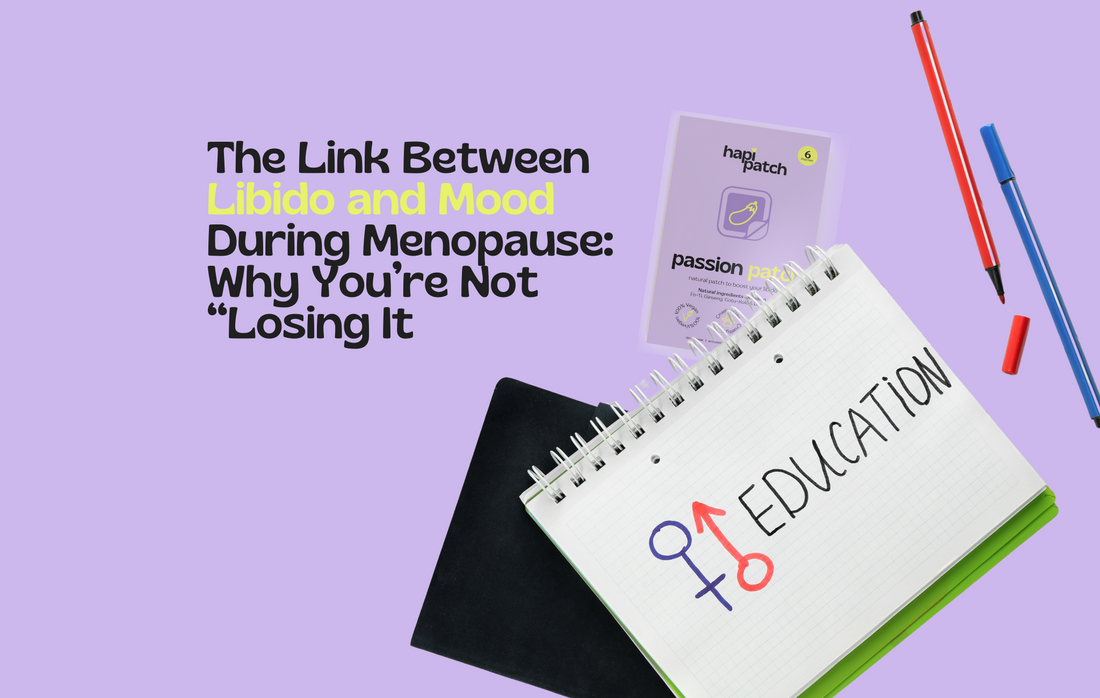It’s common for women going through menopause to feel like they’re losing control—both of their emotions and their libido. One moment, you’re feeling irritable and disconnected, and the next, you’re overcome with sadness or anxiety. Often, these emotional swings come hand-in-hand with a noticeable drop in sexual desire. But what exactly is the connection between mood and libido during menopause?
In this blog, we’ll explore the hormonal link between mood and libido, the science behind these changes, and how you can manage both mood swings and libido with natural solutions. We’ll also discuss how The Passion Patch can help support libido by stabilising hormone levels.
The Role of Hormones in Mood and Libido
Hormonal changes during menopause don’t just affect your body—they also affect your brain. The decline in oestrogen and progesterone levels can significantly impact the production of neurotransmitters like serotonin and dopamine, which are essential for regulating mood. As a result, many women experience anxiety, depression, or irritability during menopause, which can take a toll on sexual desire.
- Oestrogen and Serotonin: Oestrogen plays a key role in regulating serotonin, the neurotransmitter responsible for feelings of well-being and happiness. As oestrogen levels drop during menopause, serotonin production decreases, leading to feelings of sadness, irritability, and even depression. This emotional imbalance can naturally reduce sexual interest.
- Progesterone and GABA: Progesterone helps regulate GABA, a neurotransmitter that has a calming effect on the brain. When progesterone levels decrease during menopause, GABA production declines, often leading to heightened anxiety and stress—both of which can significantly lower libido.
Emotional Well-Being and Sexual Desire
The emotional swings that occur during menopause can make intimacy feel less appealing. Women might feel emotionally vulnerable, overwhelmed by the combination of physical symptoms (such as hot flashes, weight gain, and sleep disturbances) and the emotional toll of mood swings. Feeling irritable, anxious, or down can leave you disconnected from your partner and uninterested in sex.
These shifts can create a frustrating cycle: anxiety and depression reduce libido, leading to less intimacy, which may heighten feelings of frustration or loneliness.
Why You’re Not “Losing It”
One of the most common feelings during menopause is a sense of loss—of control, desire, and vitality. But it’s essential to recognise that these feelings are normal, and you are not "losing it." Menopause is a natural phase of life, and the hormonal changes you’re experiencing are entirely normal. By understanding the connection between mood and libido and making mindful changes, it’s possible to break the cycle and maintain emotional and sexual well-being.
Natural Solutions to Improve Mood and Libido During Menopause
There are several natural solutions that can help stabilise mood and improve libido during menopause:
- Exercise to Boost Endorphins
Exercise releases endorphins, which are natural mood elevators. Regular physical activity can help reduce stress, improve mood, and enhance circulation, which supports sexual function. Yoga, strength training, and even brisk walking can make a significant difference in how you feel emotionally and physically.
- Prioritise Mental Health
Engaging in mindfulness practices such as meditation, deep breathing, or journaling can help manage anxiety and promote a sense of calm. Additionally, talking to a therapist or joining a support group can provide emotional relief and help you process your feelings.
- Eat Mood-Boosting Foods
Certain nutrients can support neurotransmitter production, helping to stabilise mood. Foods rich in omega-3 fatty acids (such as salmon and walnuts), B vitamins (found in leafy greens and whole grains), and magnesium (present in almonds and spinach) can help improve emotional well-being and balance hormones.
- Get Enough Sleep
Sleep disturbances are common during menopause, but good-quality sleep is vital for emotional regulation and hormonal balance. Creating a bedtime routine, reducing caffeine intake, and using natural sleep aids like melatonin can help ensure you get the rest you need to feel more balanced and less stressed.
How The Passion Patch Can Help
The Passion Patch is a transdermal patch designed to naturally enhance libido by supporting hormone balance. It contains natural ingredients that help stabilise mood, reduce anxiety, and promote emotional well-being, all while boosting sexual desire. The steady release of ingredients like ginseng, Tribulus Terrestris, and L-Arginine helps support healthy hormone levels and blood flow, improving both mood and libido.
Key Ingredients in The Passion Patch That Support Mood and Libido:
- Ginseng Extract: Known for reducing fatigue and boosting energy, ginseng also helps reduce stress, which can greatly impact mood and libido.
- Damiana Extract: A natural aphrodisiac that improves mood and reduces anxiety, making it easier to enjoy intimacy.
- L-Arginine: An amino acid that supports healthy blood flow, enhancing physical arousal and improving sexual function.
By using transdermal technology, The Passion Patch ensures that these ingredients are absorbed efficiently into the bloodstream, offering consistent support for mood and libido throughout the day.
FAQ: Mood and Libido During Menopause
- Why do mood swings affect libido during menopause?
The decline in oestrogen and progesterone during menopause affects neurotransmitters like serotonin and GABA, leading to mood swings, anxiety, and depression, all of which can lower libido.
- Can The Passion Patch help improve mood and libido simultaneously?
Yes, The Passion Patch contains ingredients that support both emotional well-being and sexual desire by promoting hormonal balance and reducing stress.
- What lifestyle changes can help improve mood and libido during menopause?
Regular exercise, a balanced diet, stress management, and quality sleep are key lifestyle changes that can help stabilise mood and improve libido during menopause.
- Is it normal to feel emotionally overwhelmed during menopause?
Yes, it’s normal to feel emotionally vulnerable during menopause due to the hormonal changes that affect both mood and libido. Seeking support and practising self-care can help manage these feelings.
- How does transdermal technology in The Passion Patch help with mood and libido?
Transdermal delivery ensures that active ingredients are absorbed directly into the bloodstream, providing a steady, consistent release that helps regulate mood and libido throughout the day.

